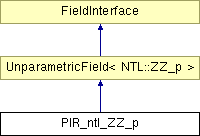|
Public Types |
| typedef NTL::ZZ_p | Element |
Public Methods |
| template<class Element2> | PIR_ntl_ZZ_p (const Element2 &d) |
| | PIR_ntl_ZZ_p (const NTL::ZZ &d) |
| | PIR_ntl_ZZ_p (const integer &d, int exp=1) |
| std::istream & | read (std::istream &in) |
Static Public Methods |
| integer & | cardinality (integer &c) |
| NTL::ZZ & | cardinality (NTL::ZZ &c) |
| integer & | characteristic (integer &c) |
| std::ostream & | write (std::ostream &out) |
| template<class Element2> Element & | init (Element &x, const Element2 &y) |
| | Init x from y.
|
| Element & | init (Element &x, const Element &y) |
| | Init from a NTL::ZZ_p.
|
| Element & | init (Element &x, const integer &y) |
| | I don't know how to init from integer.
|
| integer & | convert (integer &x, const Element &y) |
| | Convert y to an Element.
|
| Element & | assign (Element &x, const Element &y) |
| | x = y.
|
| bool | areEqual (const Element &x,const Element &y) |
| | Test if x == y.
|
| bool | isZero (const Element &x) |
| | Test if x == 0.
|
| bool | isOne (const Element &x) |
| | Test if x == 1.
|
| Element & | add (Element &x, const Element &y, const Element &z) |
| | return x = y + z
|
| Element & | sub (Element &x, const Element &y, const Element &z) |
| | return x = y - z
|
| template<class Int> Element & | mul (Element &x, const Element &y, const Int &z) |
| | return x = y * z
|
| Element & | div (Element &x, const Element &y, const Element &z) |
| | If exists a, such that a * z =y, return x = one of them. Otherwise, throw an exception.
|
| Element & | inv (Element &x, const Element &y) |
| | If y is a unit, return x = 1 / y, otherwsie, throw an exception.
|
| Element & | neg (Element &x, const Element &y) |
| | return x = -y;
|
| template<class Int> Element & | axpy (Element &r, const Element &a, const Int &x, const Element &y) |
| | return r = a x + y
|
| Element & | addin (Element &x, const Element &y) |
| | return x += y;
|
| Element & | subin (Element &x, const Element &y) |
| | return x -= y;
|
| template<class Int> Element & | mulin (Element &x, const Int &y) |
| | return x *= y;
|
| Element & | divin (Element &x, const Element &y) |
| | If y divides x, return x /= y, otherwise throw an exception.
|
| Element & | invin (Element &x) |
| | If x is a unit, x = 1 / x, otherwise, throw an exception.
|
| Element & | negin (Element &x) |
| | return x = -x;
|
| template<class Int> Element & | axpyin (Element &r, const Element &a, const Int &x) |
| | return r += a x
|
| std::ostream & | write (std::ostream &out, const Element &y) |
| | out << y;
|
| std::istream & | read (std::istream &in, Element &x) |
| | read x from istream in
|
| bool | isUnit (const Element &x) |
| | Test if x is a unit.
|
| Element & | gcd (Element &g, const Element &a, const Element &b) |
| | return g = gcd (a, b)
|
| Element & | gcdin (Element &g, const Element &b) |
| | return g = gcd (g, b)
|
| Element & | xgcd (Element &g, Element &s, Element &t, const Element &a, const Element &b) |
| | g = gcd(a, b) = a*s + b*t. and gcd (s, t) is a unit.
|
| Element & | dxgcd (Element &g, Element &s, Element &t, Element &a1, Element &b1, const Element &a, const Element &b) |
| | g = gcd(a, b) = a*s + b*t. and gcd (s, t) is a unit. s * a1 + t * b1 = a unit.
|
| bool | isDivisor (const Element &a, const Element &b) |
| | Test if a | b.
|
| Element & | normal (Element &a, const Element &b) |
| | a = normalization of b.
|
| Element & | normalIn (Element &a) |
| integer | getMaxModulus () |


 1.2.18
1.2.18